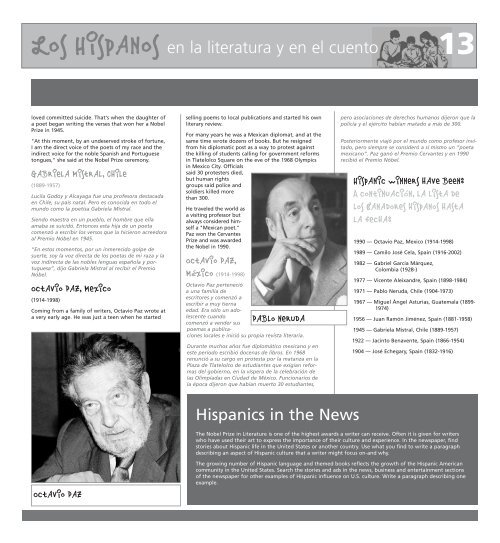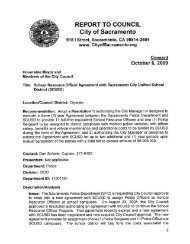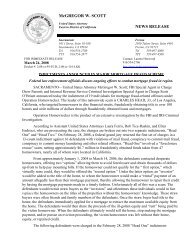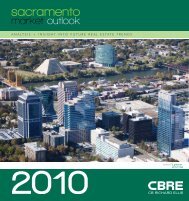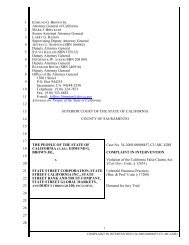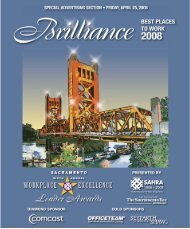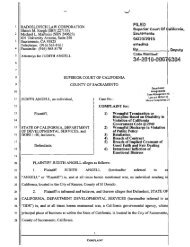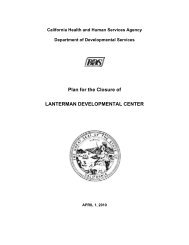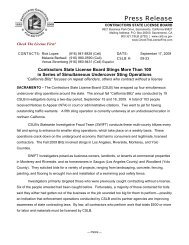Hispanic Hispanic los hispanos - The Sacramento Bee
Hispanic Hispanic los hispanos - The Sacramento Bee
Hispanic Hispanic los hispanos - The Sacramento Bee
Create successful ePaper yourself
Turn your PDF publications into a flip-book with our unique Google optimized e-Paper software.
Los Hispanos en la literatura y en el cuento 13<br />
loved committed suicide. That's when the daughter of<br />
a poet began writing the verses that won her a Nobel<br />
Prize in 1945.<br />
"At this moment, by an undeserved stroke of fortune,<br />
I am the direct voice of the poets of my race and the<br />
indirect voice for the noble Spanish and Portuguese<br />
tongues," she said at the Nobel Prize ceremony.<br />
Gabriela Mistral, Chile<br />
(1889-1957)<br />
Lucila Godoy y Alcayaga fue una profesora destacada<br />
en Chile, su país natal. Pero es conocida en todo el<br />
mundo como la poetisa Gabriela Mistral.<br />
Siendo maestra en un pueblo, el hombre que ella<br />
amaba se suicidó. Entonces esta hija de un poeta<br />
comenzó a escribir <strong>los</strong> versos que la hicieron acreedora<br />
al Premio Nóbel en 1945.<br />
“En estos momentos, por un inmerecido golpe de<br />
suerte, soy la voz directa de <strong>los</strong> poetas de mi raza y la<br />
voz indirecta de las nobles lenguas española y portuguesa”,<br />
dijo Gabriela Mistral al recibir el Premio<br />
Nóbel.<br />
Octavio Paz, Mexico<br />
(1914-1998)<br />
Coming from a family of writers, Octavio Paz wrote at<br />
a very early age. He was just a teen when he started<br />
selling poems to local publications and started his own<br />
literary review.<br />
For many years he was a Mexican diplomat, and at the<br />
same time wrote dozens of books. But he resigned<br />
from his diplomatic post as a way to protest against<br />
the killing of students calling for government reforms<br />
in Tlatelolco Square on the eve of the 1968 Olympics<br />
in Mexico City. Officials<br />
said 30 protesters died,<br />
but human rights<br />
groups said police and<br />
soldiers killed more<br />
than 300.<br />
He traveled the world as<br />
a visiting professor but<br />
always considered himself<br />
a "Mexican poet."<br />
Paz won the Cervantes<br />
Prize and was awarded<br />
the Nobel in 1990.<br />
Octavio Paz,<br />
México (1914-1998)<br />
Octavio Paz perteneció<br />
a una familia de<br />
escritores y comenzó a<br />
escribir a muy tierna<br />
edad. Era sólo un adolescente<br />
cuando<br />
comenzó a vender sus<br />
poemas a publicaciones<br />
locales e inició su propia revista literaria.<br />
Pablo Neruda<br />
Durante muchos años fue diplomático mexicano y en<br />
este período escribió docenas de libros. En 1968<br />
renunció a su cargo en protesta por la matanza en la<br />
Plaza de Tlatelolco de estudiantes que exigían reformas<br />
del gobierno, en la víspera de la celebración de<br />
las Olimpíadas en Ciudad de México. Funcionarios de<br />
la época dijeron que habían muerto 30 estudiantes,<br />
pero asociaciones de derechos humanos dijeron que la<br />
policía y el ejército habían matado a más de 300.<br />
Posteriormente viajó por el mundo como profesor invitado,<br />
pero siempre se consideró a sí mismo un “poeta<br />
mexicano”. Paz ganó el Premio Cervantes y en 1990<br />
recibió el Premio Nóbel.<br />
<strong>Hispanic</strong> winners have been:<br />
A continuación, la lista de<br />
<strong>los</strong> ganadores <strong>hispanos</strong> hasta<br />
la fecha:<br />
1990 — Octavio Paz, Mexico (1914-1998)<br />
1989 — Camilo José Cela, Spain (1916-2002)<br />
1982 — Gabriel García Márquez,<br />
Colombia (1928-)<br />
1977 — Vicente Aleixandre, Spain (1898-1984)<br />
1971 — Pablo Neruda, Chile (1904-1973)<br />
1967 — Miguel Ángel Asturias, Guatemala (1899-<br />
1974)<br />
1956 — Juan Ramón Jiménez, Spain (1881-1958)<br />
1945 — Gabriela Mistral, Chile (1889-1957)<br />
1922 — Jacinto Benavente, Spain (1866-1954)<br />
1904 — José Echegary, Spain (1832-1916)<br />
<strong>Hispanic</strong>s in the News<br />
<strong>The</strong> Nobel Prize in Literature is one of the highest awards a writer can receive. Often it is given for writers<br />
who have used their art to express the importance of their culture and experience. In the newspaper, find<br />
stories about <strong>Hispanic</strong> life in the United States or another country. Use what you find to write a paragraph<br />
describing an aspect of <strong>Hispanic</strong> culture that a writer might focus on-and why.<br />
Octavio Paz<br />
<strong>The</strong> growing number of <strong>Hispanic</strong> language and themed books reflects the growth of the <strong>Hispanic</strong> American<br />
community in the United States. Search the stories and ads in the news, business and entertainment sections<br />
of the newspaper for other examples of <strong>Hispanic</strong> influence on U.S. culture. Write a paragraph describing one<br />
example.


